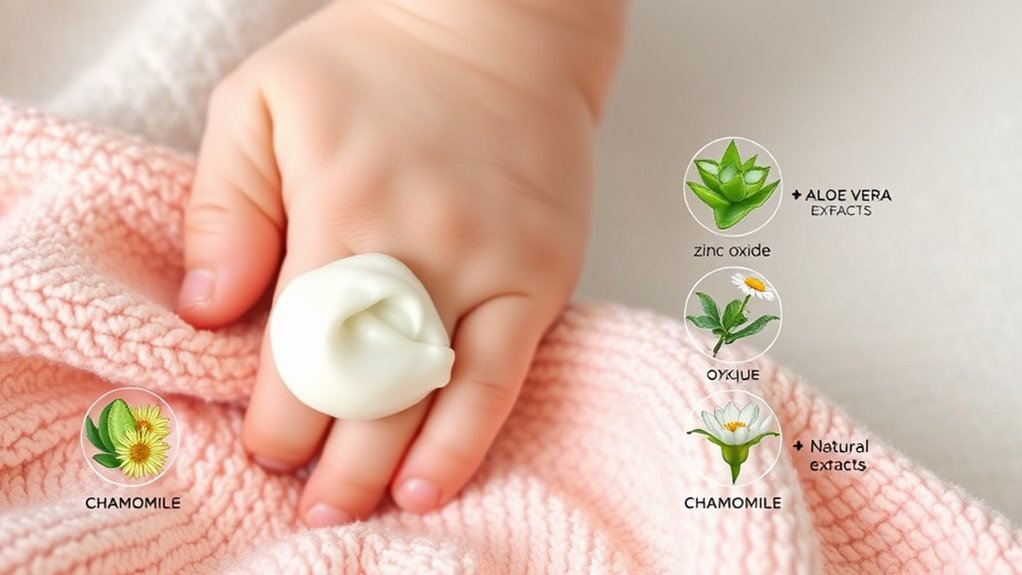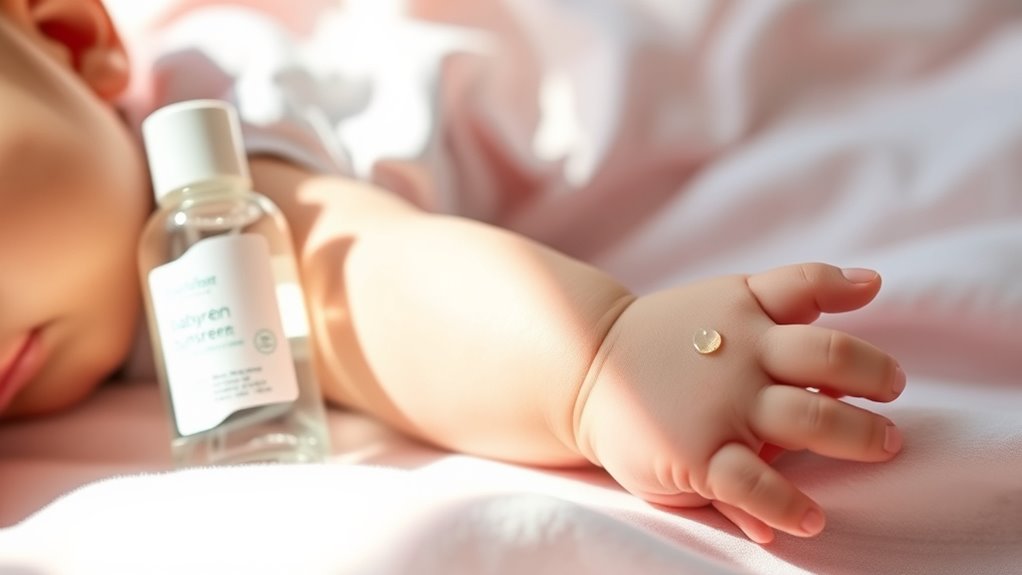For safe, effective baby sunscreen, choose products with mineral blockers like zinc oxide or titanium dioxide. These create a physical barrier, reflecting UV rays and reducing irritation or hormonal concerns linked to chemical filters. Mineral sunscreens are stable, long-lasting, and gentle—ideal for sensitive or delicate skin. Look for labels indicating “mineral” or “physical” protection, and consider options with added safety certifications. Exploring further will help you make the most informed choice for your little one’s skin.
Key Takeaways
- Choose mineral blockers like zinc oxide or titanium dioxide for safe, effective, and gentle sun protection for babies.
- Avoid chemical filters such as oxybenzone and avobenzone, which may cause irritation and hormonal concerns.
- Opt for mineral sunscreens labeled “physical” or “mineral-based” to ensure physical barrier protection.
- Prioritize broad-spectrum formulas that protect against both UVA and UVB rays with stable, long-lasting ingredients.
- Select products with minimal fragrances, preservatives, and certified halal options for added safety and ethical assurance.

Are you wondering which ingredients are safest for your baby’s delicate skin in sunscreen? It’s a common concern among parents who want to protect their little ones from harmful UV rays without risking irritation or long-term skin issues. When choosing a baby sunscreen, it’s essential to understand the difference between chemical filters and mineral blockers. Chemical filters, such as oxybenzone, avobenzone, and octocrylene, work by absorbing UV radiation and converting it into heat, which is then dispersed from the skin. While these ingredients are effective, they can sometimes cause skin irritation, especially in sensitive baby skin, and some studies suggest they may be absorbed into the bloodstream, raising concerns about hormonal disruption. That’s why many parents prefer mineral blockers, which act as physical barriers on the skin’s surface, reflecting and scattering UV rays away from the skin. Common mineral blockers include zinc oxide and titanium dioxide, both of which are gentle, safe, and often recommended for babies due to their minimal risk of irritation.
Mineral blockers are a popular choice because they provide broad-spectrum protection against both UVA and UVB rays without penetrating the skin deeply. They’re considered safer for sensitive or compromised skin, making them ideal for babies who have delicate, developing skin. Unlike chemical filters, mineral blockers tend to be less likely to cause allergic reactions or irritation, which is vital when dealing with a baby’s sensitive skin. When selecting a sunscreen, look for formulas labeled “physical” or “mineral-based,” with zinc oxide or titanium dioxide listed as the primary active ingredients. These ingredients sit on top of the skin, creating a protective barrier that deflects harmful rays without the need for chemical absorption. Additionally, mineral-based sunscreens often contain fewer preservatives and fragrances, further reducing the risk of irritation or allergic reactions. Research shows that mineral blockers are also less likely to degrade in sunlight, maintaining their effectiveness longer than some chemical filters. This sunlight stability makes them a reliable choice for outdoor activities, especially for babies who may be exposed to the sun for extended periods.
It’s also worth noting that mineral blockers are generally more stable in sunlight, meaning they don’t break down as quickly as some chemical filters, providing longer-lasting protection. This stability makes them a reliable choice for outdoor activities, especially for babies who may be exposed to the sun for extended periods. Using mineral-based sunscreens with mineral blockers is a smart step toward protecting your baby’s skin safely, giving you peace of mind that you’re using a gentle, effective product free of potentially harmful chemical filters. Additionally, halal certification can be an important consideration for some parents seeking products that align with their dietary and ethical standards.
Frequently Asked Questions
Are Mineral Sunscreens Safer Than Chemical Ones for Babies?
You might wonder if mineral sunscreens are safer than chemical formulations for your baby. Generally, mineral sunscreens use ingredients like zinc oxide or titanium dioxide, which sit on the skin and reflect UV rays, making them gentler and often safer for sensitive skin. Chemical formulations absorb UV rays but contain ingredients like oxybenzone or avobenzone, which some parents prefer to avoid due to concerns about ingredient safety and potential irritation.
How Often Should I Reapply Baby Sunscreen During Outdoor Activities?
Did you know that skin damage from the sun can happen in just 15 minutes? During outdoor activities, you should reapply baby sunscreen every two hours, especially if your little one is sweating or in water. Follow reapplication tips like using a generous amount and covering all exposed skin. Keep a travel-sized sunscreen handy, and don’t forget to reapply promptly after swimming or towel drying to keep your baby protected.
Can Baby Sunscreens Be Used on Infants Under Six Months?
You should avoid using baby sunscreens on infants under six months because of strict baby sunscreen regulations. Their skin is very sensitive, and many products may contain ingredients that could cause irritation or an allergic reaction. Instead, keep your baby in the shade, dress them in protective clothing, and use hats with brims. Always consult your pediatrician before applying any sunscreen to infants under six months to guarantee their safety.
Are There Natural or Organic Baby Sunscreen Options Available?
You’ll find natural or organic baby sunscreen options that use natural ingredients and hold organic certifications. These products typically avoid harsh chemicals and synthetic fragrances, making them gentler for your baby’s sensitive skin. Look for labels with organic certifications like USDA Organic, which ensure the sunscreen meets strict standards. Always read the ingredient list carefully to confirm it contains natural ingredients and is free from potentially harmful chemicals.
How Do I Identify Safe Preservatives in Baby Sunscreens?
Did you know that some preservatives in sunscreens can cause skin irritation or allergies? When choosing baby sunscreens, check ingredient labels carefully. Look for safe preservative types like vitamin E or natural extracts, and avoid artificial preservatives like parabens or formaldehyde releasers. Always read labels thoroughly to make certain you’re selecting a product with gentle, non-toxic preservatives that protect your baby’s delicate skin without unnecessary risks.
Conclusion
Choosing the right baby sunscreen ingredients is essential for your little one’s safety. Always look for mineral-based options with zinc oxide or titanium dioxide, which are gentle and effective. Did you know that babies have thinner skin, making them 2.5 times more vulnerable to UV rays? By selecting trusted, safe ingredients, you’re protecting your baby’s delicate skin and reducing their risk of sun damage. Trust your choices—your baby’s skin will thank you.









